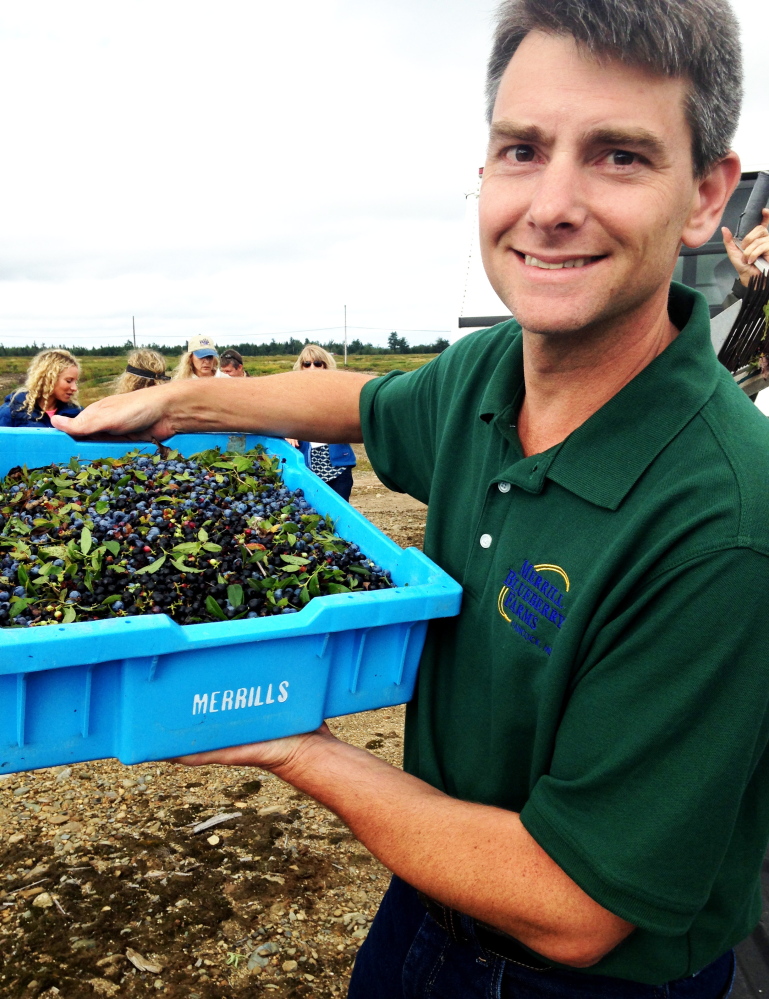Todd Merrill’s family-owned company, based in Ellsworth, has been in business since 1925, and he’s a fourth-generation blueberry farmer/processor. But he spent the first half of his career working elsewhere and returned to run the company just seven years ago. Since then he’s led Merrill Blueberry Farms to become the first – and only – company in the country to process organic wild blueberries for the frozen market. We talked to him about innovations, visits from rabbis and why Maine teenagers should get themselves up to Ellsworth and start raking.
SUCKED BACK IN: Until 2007, Merrill worked outside the family business, primarily at Tyler Technologies. He really liked that job and maybe would still be there if he’d hadn’t gotten a fateful call from his uncle and father. “I said, what am I here for?” he remembered. The deal: His uncle was sick, his father was getting to be retirement age. “They said, ‘We’re going to have to sell this to someone else completely or we’ll have to hire management to come in. Or it’s you.’ And that was it.”
HOW HE DESCRIBES HIMSELF: “I like to say, I haul Porta Potties by day and I sell blueberries by night,” he joked. “You have to have that connection between everything that is happening in the field and what happens on the sales end.”
ALSO, HE ENTERTAINS: “We’ve had the alphabet here today,” Merrill quipped. Starting with inspections by the DEP (Maine Department of Environmental Protection), then the USDA (United States Department of Agriculture), then a tour group with WBANA (the Wild Blueberry Association of North America). Also some rabbis from New Jersey, who inspected fresh product being processed that day, blessed it, certified it kosher and bought the load.
GOING ORGANIC: Merrill started processing organic berries five years ago after an organic grower approached him and offered to sell him the whole crop. A light bulb went off in his head; there would be a market for organic wild blueberries. (Or, you know, the way they were back in 1925 when the Merrills started the business.)
SMALL BUT GROWING: He’ll do about 200,000 pounds of organic this season (likely to run about five weeks from August into September). That’s only two or three percent of his overall business, but the number of growers approaching him is increasing. “They’re starting to come out of the woodwork,” he said.
WHY AREN’T MORE PROCESSORS GOING ORGANIC? Cost, naturally. You can charge more for them, but you have to pay more to get them. Wild blueberries are wild, after all – or, more technically, what is known as an “assisted wild crop.” But that doesn’t mean it doesn’t take some work to get present-day yields (up to 5,000 pounds an acre), including using pesticides to keep off pests such as the Blueberry Maggot (aka, the blueberry fruit fly). Merrill says there are organic pesticides, “but they’re expensive and my guys tend to be 3 acres in the backyard kind of growers. The majority of mine don’t do anything. They’re out there pulling weeds and that’s about it.”
SUPPLY IS LIMITED: Correspondingly, the organic yields are small, “about 1,000 pounds an acre,” Merrill said. Wild blueberry fields that are managed (pesticides, irrigation, imported pollinators, frost protection) can yield 5,000 to 10,000 pounds an acre. Which explains why it’s particularly hard to find rakers who are willing to work the organic fields; low yields mean smaller profits for that back-breaking work. And typically, modern harvesting equipment can’t be used on an organic field because there are too many weeds and rocks in the field.
GOOD RAKERS ARE HARD TO FIND: “I can’t even begin to tell you the frustrations,” Merrill said. Particularly the 20-somethings. “As we say, a tractor always shows up to work. A tractor doesn’t get an OUI the night before.”
DON’T TEENAGERS NEED A BUCK? “School-age kids are ideal,” Merrill said. They’ve got the summers off. They’re hearty. But they no longer seem to be willing, he said. “We advertise every year. A lot of kids don’t need the money anymore. And it’s looked upon as something migrant workers do.” He does get it: “I was just short of having to have a gun put to my head to rake blueberries when I was a kid.” But he’s paying: $2.75 a 30-pound box. A fast raker, he said, can do 160 boxes a day. And the work can be seven days a week if the weather is right.
ORGANIC FIRST: Among the machinations Merrill has to go through to process the organic berries: These berries can’t ride on the same truck with conventional wild blueberries. They have to be placed into specifically designated boxes, distinguished by color. Once they hit the processing plant, they go through the same fast-freeze process (IQF, or individually quick frozen) as conventional berries, but they get to go first, when the machinery has just been cleaned.
NOT AT A STORE NEAR YOU: It’s highly unlikely you’ve encountered any of the frozen organic berries Merrill has processed because they’re selling them as an ingredient to muffin makers and the like. (Hermit Woods winery in Meredith, New Hampshire, uses Merrill organic wild blueberries for some of its wines, he said.)
GRAND AMBITION: “Someday I hope to be doing millions of pounds of organic every year.”
Copy the Story LinkSend questions/comments to the editors.




Success. Please wait for the page to reload. If the page does not reload within 5 seconds, please refresh the page.
Enter your email and password to access comments.
Hi, to comment on stories you must . This profile is in addition to your subscription and website login.
Already have a commenting profile? .
Invalid username/password.
Please check your email to confirm and complete your registration.
Only subscribers are eligible to post comments. Please subscribe or login first for digital access. Here’s why.
Use the form below to reset your password. When you've submitted your account email, we will send an email with a reset code.